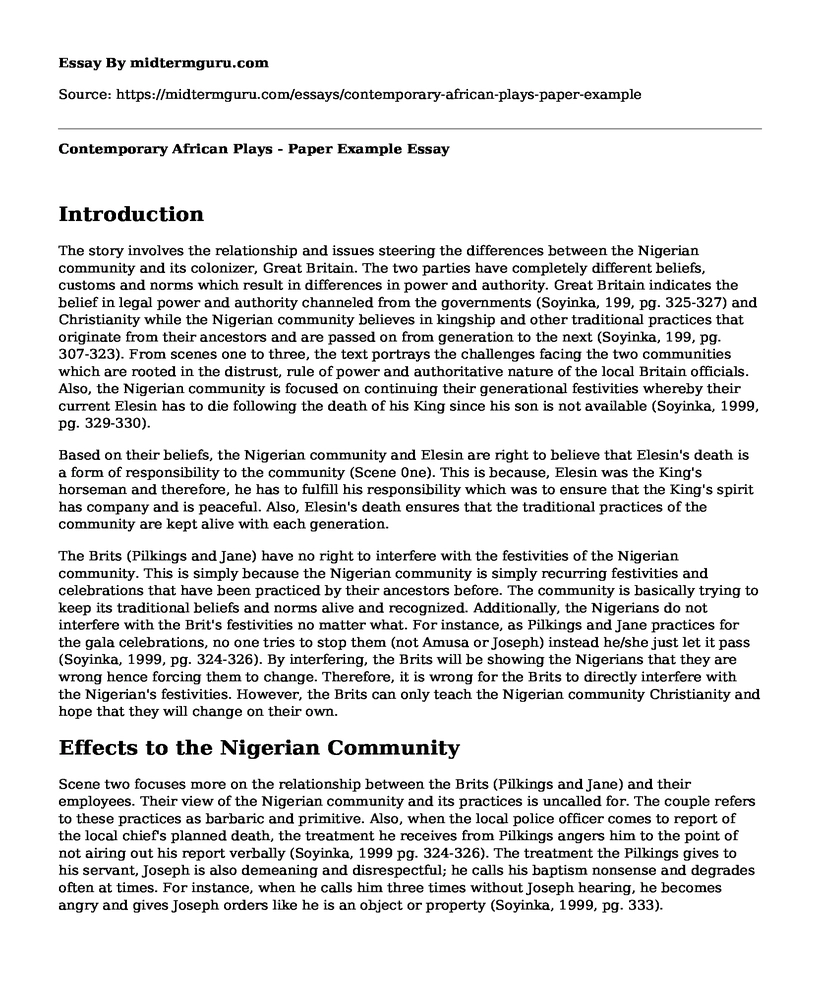Introduction
The story involves the relationship and issues steering the differences between the Nigerian community and its colonizer, Great Britain. The two parties have completely different beliefs, customs and norms which result in differences in power and authority. Great Britain indicates the belief in legal power and authority channeled from the governments (Soyinka, 199, pg. 325-327) and Christianity while the Nigerian community believes in kingship and other traditional practices that originate from their ancestors and are passed on from generation to the next (Soyinka, 199, pg. 307-323). From scenes one to three, the text portrays the challenges facing the two communities which are rooted in the distrust, rule of power and authoritative nature of the local Britain officials. Also, the Nigerian community is focused on continuing their generational festivities whereby their current Elesin has to die following the death of his King since his son is not available (Soyinka, 1999, pg. 329-330).
Based on their beliefs, the Nigerian community and Elesin are right to believe that Elesin's death is a form of responsibility to the community (Scene 0ne). This is because, Elesin was the King's horseman and therefore, he has to fulfill his responsibility which was to ensure that the King's spirit has company and is peaceful. Also, Elesin's death ensures that the traditional practices of the community are kept alive with each generation.
The Brits (Pilkings and Jane) have no right to interfere with the festivities of the Nigerian community. This is simply because the Nigerian community is simply recurring festivities and celebrations that have been practiced by their ancestors before. The community is basically trying to keep its traditional beliefs and norms alive and recognized. Additionally, the Nigerians do not interfere with the Brit's festivities no matter what. For instance, as Pilkings and Jane practices for the gala celebrations, no one tries to stop them (not Amusa or Joseph) instead he/she just let it pass (Soyinka, 1999, pg. 324-326). By interfering, the Brits will be showing the Nigerians that they are wrong hence forcing them to change. Therefore, it is wrong for the Brits to directly interfere with the Nigerian's festivities. However, the Brits can only teach the Nigerian community Christianity and hope that they will change on their own.
Effects to the Nigerian Community
Scene two focuses more on the relationship between the Brits (Pilkings and Jane) and their employees. Their view of the Nigerian community and its practices is uncalled for. The couple refers to these practices as barbaric and primitive. Also, when the local police officer comes to report of the local chief's planned death, the treatment he receives from Pilkings angers him to the point of not airing out his report verbally (Soyinka, 1999 pg. 324-326). The treatment the Pilkings gives to his servant, Joseph is also demeaning and disrespectful; he calls his baptism nonsense and degrades often at times. For instance, when he calls him three times without Joseph hearing, he becomes angry and gives Joseph orders like he is an object or property (Soyinka, 1999, pg. 333).
As characters, the Brits are arrogant and disrespectful towards the Nigerian community and their employees. Pilkings and Jane consider themselves privileged and above the authority and rule of law that they themselves have set up and implemented (as colonizers). According to Soyinka, 1999, the Brits view the Nigerian community as less valuable and unworthy of any power, authority or choice. They basically see themselves above the Nigerians and that is why they seem to treat the community in a demeaning manner by e.g. giving strict orders to their employee Joseph, disrespecting the police officer even after they realize that their dressings have angered him and by trying to forcefully interfere with the community's festivities.
The character of the Brits has made firm my reason as to why they should not interfere with the community's celebrations and practices by increasing the reliability of my reasons. Soyinka 1999 (scene two), shows that the Brits treatment towards the Nigerians even their own employees is cruel, rude and disrespectful. They do not show any value for the work being done by their employee (Joseph and Amusa) and they do not show any respect for the community's beliefs and traditions. Therefore, their character is clearly negative towards the Nigerians which gives the Nigerians a chance to rebel and have their own stand; no interference from the Brits.
References
Soyinka, W. (1999). Contemporary African Plays. Death and the King' Horseman. pg. 307-348 Retrieved from: https://www.uibk.ac.at/anglistik/staff/davis/death-and-the-king-s-horseman---wole-soyinka.pdf
Cite this page
Contemporary African Plays - Paper Example. (2022, Oct 20). Retrieved from https://midtermguru.com/essays/contemporary-african-plays-paper-example
If you are the original author of this essay and no longer wish to have it published on the midtermguru.com website, please click below to request its removal:
- Comparative Essay on Artistic Styles
- Comparative Essay on Magnificent and Cold Blood Films
- Critical Essay on Modern Times by Charlie Chaplin
- Essay Sample on Music in Africa
- The Media Has Hurt How Young Women View Themselves in a Global Society - Annotated Bibliography
- Tracing Society's Pattern: Literature, TV & Movies - Essay Sample
- Exploring the Fascinating World of Social Media: A Journey of Discovery - Essay Sample







